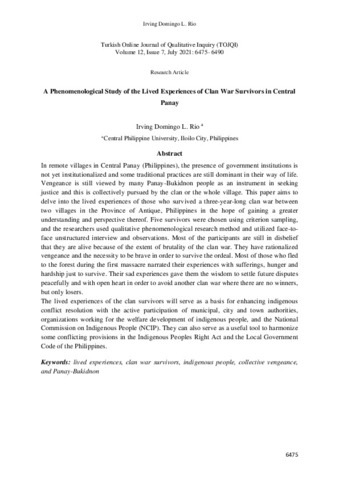A phenomenological study of the lived experiences of clan war survivors in Central Panay
| dc.contributor.author | Rio, Irving Domingo | |
| dc.coverage.spatial | Central Panay | en_US |
| dc.coverage.spatial | Panay Island | en_US |
| dc.date.accessioned | 2021-08-27T07:11:12Z | |
| dc.date.available | 2021-08-27T07:11:12Z | |
| dc.date.issued | 2021-07 | |
| dc.identifier.citation | Rio, I. D. L. (2021). A phenomenological study of the lived experiences of clan war survivors in Central Panay. Turkish Online Journal of Qualitative Inquiry, 12(7), 6475-6490 | en_US |
| dc.identifier.issn | 6475-6490 | |
| dc.identifier.uri | https://hdl.handle.net/20.500.12852/1331 | |
| dc.description | Journal article | en_US |
| dc.description.abstract | In remote villages in Central Panay (Philippines), the presence of government institutions is not yet institutionalized and some traditional practices are still dominant in their way of life. Vengeance is still viewed by many Panay-Bukidnon people as an instrument in seeking justice and this is collectively pursued by the clan or the whole village. This paper aims to delve into the lived experiences of those who survived a three-year-long clan war between two villages in the Province of Antique, Philippines in the hope of gaining a greater understanding and perspective thereof. Five survivors were chosen using criterion sampling, and the researchers used qualitative phenomenological research method and utilized face-to-face unstructured interview and observations. Most of the participants are still in disbelief that they are alive because of the extent of brutality of the clan war. They have rationalized vengeance and the necessity to be brave in order to survive the ordeal. Most of those who fled to the forest during the first massacre narrated their experiences with sufferings, hunger and hardship just to survive. Their sad experiences gave them the wisdom to settle future disputes peacefully and with open heart in order to avoid another clan war where there are no winners, but only losers. The lived experiences of the clan survivors will serve as a basis for enhancing indigenous conflict resolution with the active participation of municipal, city and town authorities, organizations working for the welfare development of indigenous people, and the National Commission on Indigenous People (NCIP). They can also serve as a useful tool to harmonize some conflicting provisions in the Indigenous Peoples Right Act and the Local Government Code of the Philippines. | en_US |
| dc.description.sponsorship | University Research Center | en_US |
| dc.language.iso | en | en_US |
| dc.relation.uri | https://www.tojqi.net/index.php/journal/article/view/4853/3411 | en_US |
| dc.subject.lcsh | Philippines--Panay Island | en_US |
| dc.subject.lcsh | Indigenous peoples | en_US |
| dc.subject.lcsh | Indigenous peoples--Legal status, laws, etc. | en_US |
| dc.subject.lcsh | Indigenous peoples--Social life and customs | en_US |
| dc.subject.lcsh | Revenge | en_US |
| dc.subject.lcsh | War | en_US |
| dc.subject.lcsh | Conflict management | en_US |
| dc.subject.lcsh | Phenomenology | en_US |
| dc.subject.lcsh | Massacre survivors | en_US |
| dc.subject.lcsh | Justice, Administration of | en |
| dc.title | A phenomenological study of the lived experiences of clan war survivors in Central Panay | en_US |
| dc.type | Article | en_US |
| dc.citation.firstpage | 6475 | en_US |
| dc.citation.lastpage | 6490 | en_US |
| dc.citation.journaltitle | Turkish Online Journal of Qualitative Inquiry | en_US |
| dc.citation.volume | 12 | en_US |
| dc.citation.issue | 7 | en_US |
| local.subject | Lived experiences | en_US |
| local.subject | Clan war survivors | en_US |
| local.subject | Indigenous people | en_US |
| local.subject | Collective vengeance | en_US |
| local.subject | Panay Bukidnon | en_US |
| local.relation.associatedcontent | https://repository.cpu.edu.ph/handle/20.500.12852/1648 Research report | en |
이 항목의 파일
This item appears in the following Collection(s)
-
Journal articles [11]


